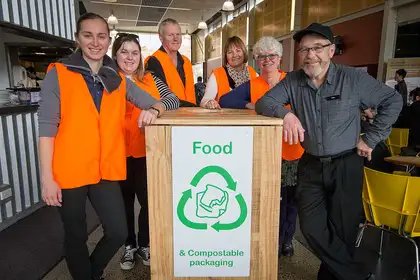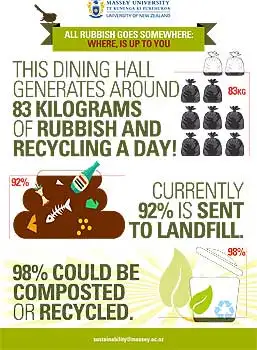
From left: Ms Battman, Ms Sandilands, Anthony Dahlkamp from Campus Living Villages, Ms Probert, Dr Ryan and Alan Shannon from Compass Group.
A new system for managing food and compostable waste aims to reduce the amount of rubbish being sent to landfills from Massey University’s Manawatū campus student dining hall.
The hall generates about 83kg of waste daily. Previously 92 per cent was being dumped, despite the fact 98 per cent was compostable or recyclable.
Now, new bins, signage and posters in the hall aim to divert 91 per cent of waste to a composting facility, with 7 per cent recycled and just 2 per cent dumped.
The campaign to encourage diners to dispose of waste in the correct bins features the tagline "all rubbish goes somewhere: where is up to you". It is a collaborative effort between the Campus Operations and Sustainability Group, led by campus operations and security manager Kerry-Lee Probert, dining hall caterers Compass Group and the Palmerston North City Council waste behaviour change and education coordinator Samantha Battman.
Massey sustainability director Dr Allanah Ryan says the new system is a win for the environment, as less landfill waste equates to fewer greenhouse gas emissions.
“This initiative is an example of the kind of work that we can be doing ahead of the Sustainability Strategic Plan being finalised,” she says.

Posters have been placed in the dining hall highlighting the importance of correctly disposing of waste.
The majority of items sold in the dining hall use compostable packaging and all disposable cups, cutlery, straws, plates and take-away containers are made from compostable materials. Efforts are under way to further reduce the amount of non-compostable packaging sold.
The initiative has been supported by research undertaken as part of a Living Lab project by master’s student Sarah Sandilands. As part of her thesis Ms Sandilands observed students at dinner time to discover how many people ate in the dining hall. She found at least 80 per cent of patrons chose to dine-in and of those, a large number were requesting takeaway containers that, although compostable, subsequently ended up in bins that were sent to landfills.
She says it is better for those dining in the hall to use washable plates as their impact is less detrimental to the environment. Under the new system dining hall staff are using different prompts when serving students, increasing plate usage from less than 5 per cent to almost 40 per cent.
The Wellington and Auckland campus are considering how they might also implement more sustainable food waste practices.
More than 200 staff and students shared their views on the draft Sustainability Strategic Plan through individual submissions and meetings. It will be submitted to the Senior Leadership Team in the coming months.